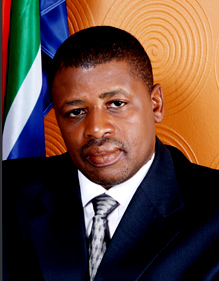|
Getting your Trinity Audio player ready...
|
 Our hero of the week has shown the importance of integrity in governance by exposing deep levels of financial mismanagement, lack of accountability and corruption in municipalities.
Our hero of the week has shown the importance of integrity in governance by exposing deep levels of financial mismanagement, lack of accountability and corruption in municipalities.
But it’s one thing to expose, and another to analyse the problem, get to the root cause and come up with recommendations. The office of the auditor-general, led by Terence Nombembe, has successfully managed both. Find out more about this here.
Independent from government, the auditor-general is a Chapter 9 institution set up to annually review spending in government departments, public entities, municipalities and public institutions.
The latest set of results to come out of the office are the municipal audit outcomes for 2010-2011, which reveal that only 13 municipalities – a mere 5% of the total number in the country – had clean books for that period.
A job that focuses on exposing the truth is a sure way to stoke controversy and attract enemies. Just this week media reports surfaced of municipal auditors being intimidated and instructed to cover up evidence of corruption in local government.
"In some cases, auditors are given instructions that 'you will sweep this under the carpet’,” said Claudelle von Eck, CEO of the Internal Audit Association of SA.
"It becomes worrying because internal auditors are meant to be the whistleblowers," she was quoted as saying.
In terms of South Africa’s law, national government is unable to intervene in local government’s affairs until certain criteria are met, meaning leaders higher up and the auditor-general himself have their hands tied.
“We do not have the power to manage government. Our responsibility is reporting on the performance of government in terms of its credibility of information and strength of internal controls.”
It’s this constructive form of reporting that earns the Nombembe’s office full marks.
Moneyweb recently reported that several members of parliament have called for more power to be given to the auditor-general’s office – proof that those in positions of power take the latest municipal audit results seriously.
But Nombembe is sticking to the original mandate of his office. “We are not prosecutors, we are auditors,” he said.
He said the messages communicated by the auditor-general’s office focus on how South Africa’s leadership is responding to its action plans.
“Part of those action plans is the achievement of milestones. If they do achieve the milestones we will acknowledge that and if they don’t, we will report as such – giving reasons …”
Nombembe said his office was in “regular and intimate” contact with leaders to work out obstacles to achieving these milestones, and that since the latest audit results, the appetite for communication had been heightened.
“We are being heard by government. The honouring of appointments with leadership has become even better post this audit. Last year one of the reasons we could not achieve some of the set targets was because leaders did not necessarily make themselves available.”



